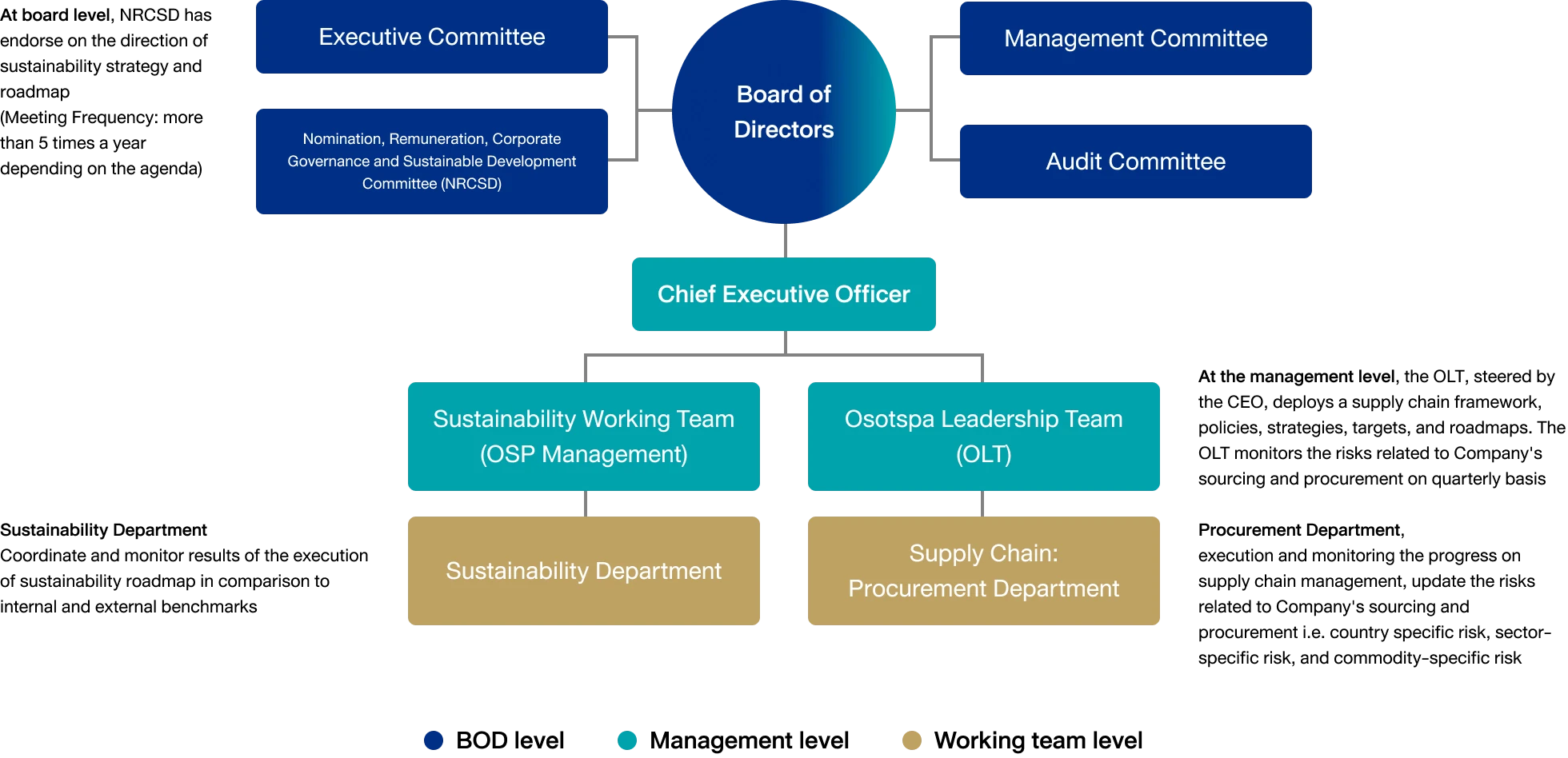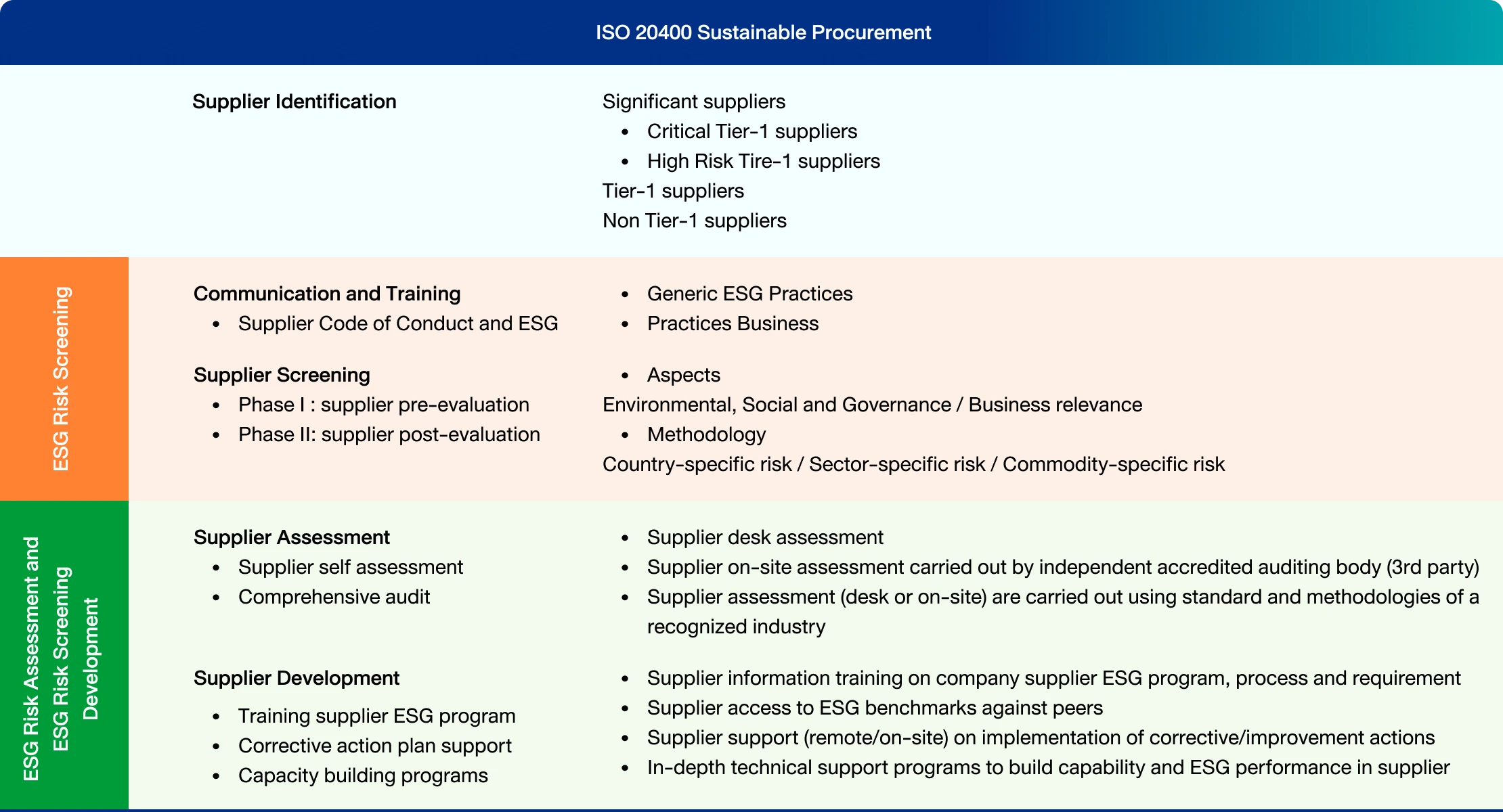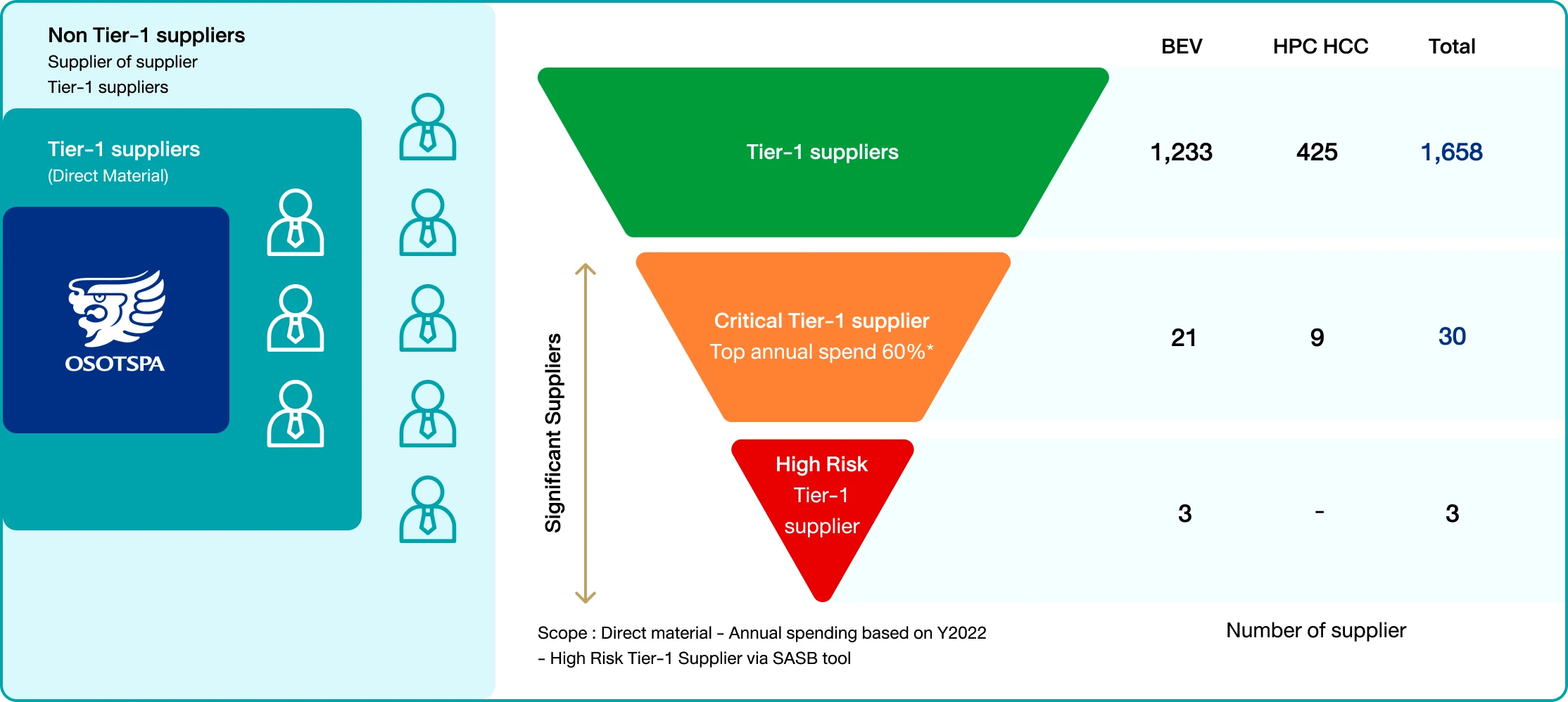

Sustainable Supply Chain
Highlight Performance

Management Approach
Osotspa has encouraged Tier-1 suppliers to comply with the Supplier s Code of Conduct and ESG guideline manual. Company focuses on efficient and ethical supply chain management by incorporating sustainability concerns into every step of the supplier search and selection process. ESG criteria are included in accordance with ISO20400 Sustainable Procurement standards, covering key issues of Supplier Screening. Our action plan includes assessing sustainability risk of Tier 1 suppliers, categorizing them as High-Risk Suppliers and Significant Tier-1 Suppliers. Our approach involves receiving third-party audits, implementing corrective/improvement actions, and training and developing skills for our employees through the Supplier ESG Program. We provide a self-assessment form based on the SASB® Standards to suppliers through second-party audits on-site assessments conducted by Osotspa's Supply Chain Team.
Osotspa Supplier Relationship Management
Osotspa collaborates with a wide range of suppliers, from multinational corporations to community enterprises and small and medium-sized enterprises (SMEs), to ensure high quality and reasonable pricing of raw materials and supplies for packaging and OEM production in order to achieve sustainability goals and manage supplier risk across the entire supply chain and help suppliers advance their innovations to maximize their potential and practice social and environmental responsibility
Supplier Relationship Management
Supplier Categorization
To enhance our sustainability strategy, Osotspa has adopted international guidelines for supplier categorization

Critical Suppliers
are those who account for more than 67% of the total purchase from total active suppliers. These include suppliers who passed the assessment and were added to the approved vendor list, strategic suppliers who participate in procurement planning or joint project initiatives, and exclusive suppliers who are difficult to be replaced
Proportion of Suppliers Volume
Proportion of Purchase Volume from Critical Tier 1 Suppliers to Total Purchase Volume from all Approved Vendors
High-Risk Suppliers
of suppliers assessed with substantial actual/potential negative impacts
Proportion of Suppliers
| Suppliers Screening | Total Number |
|---|---|
| Tier-1 Suppliers | 1,761 |
| Non-Tier 1 Suppliers | 213 |
| Critical Tier 1 Suppliers | 33 |
| Critical Non-Tier 1 Suppliers | 213 |
| Significant Tier-1 Suppliers | 33 |
| Significant Non-tier 1 Suppliers | 213 |
| Significant Tier-1 and Non-tier 1 Suppliers | 246 |
| % of total spend on significant suppliers in Tier-1 | 51 |
Supplier Screening
Osotspa prioritizes the efficient and ethical management of its supply chain. We integrate sustainability factors into every stage of the recruitment and selection process for new suppliers. Adhering to ISO 20400 Sustainable Procurement standards, we have established criteria for evaluating potential vendors based on their ESG qualifications. Our firm commitment is not to conduct business with suppliers who cannot fulfill basic ESG requirements within a specific timeframe. Hence suppliers with better ESG performance are preferred by applying a minimum weight to ESG criteria in supplier selection and contract awarding.
Osotspa’s vendor list undergoes regular reviews based on business qualifications, ESG operations
Supplier Assessment Criteria
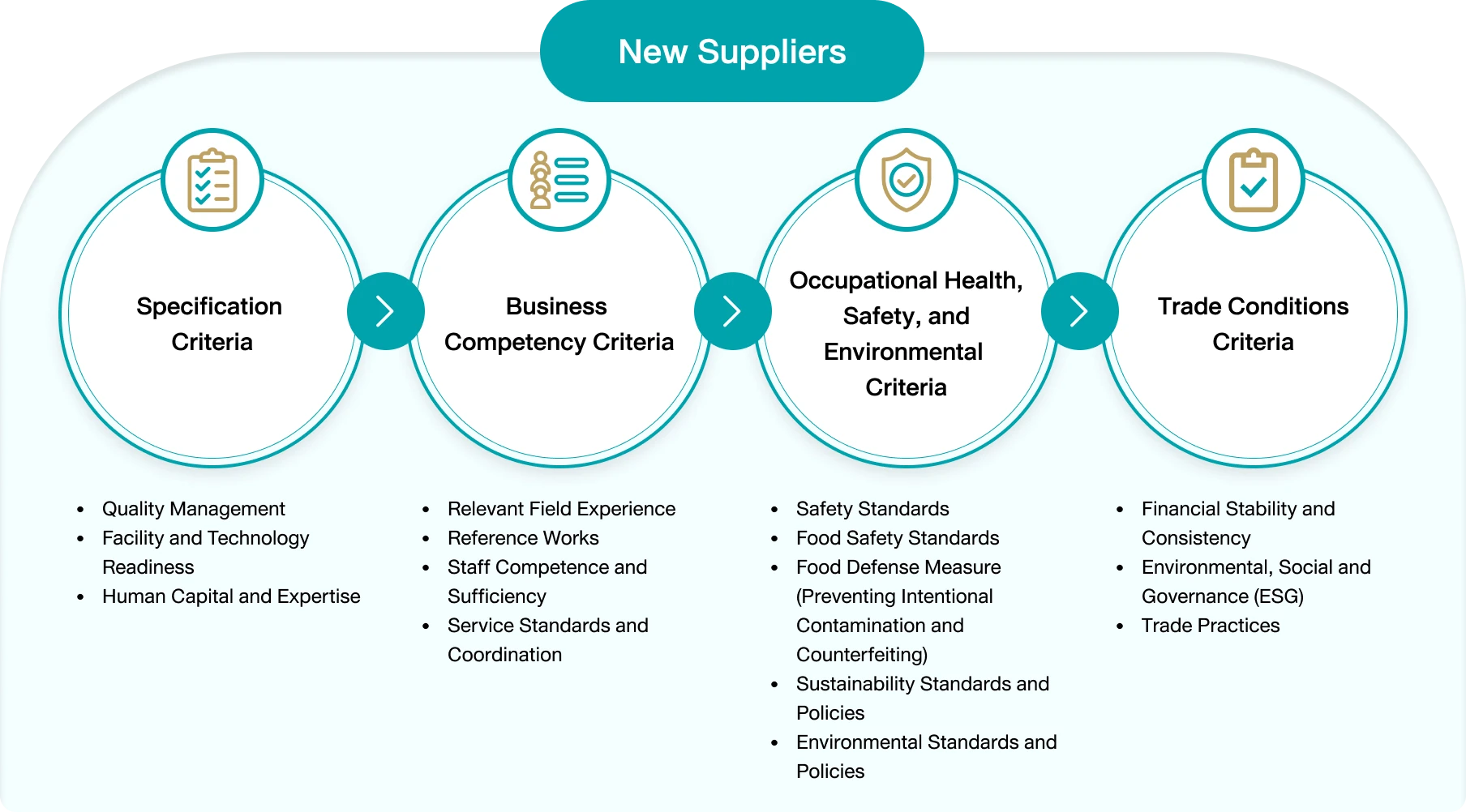
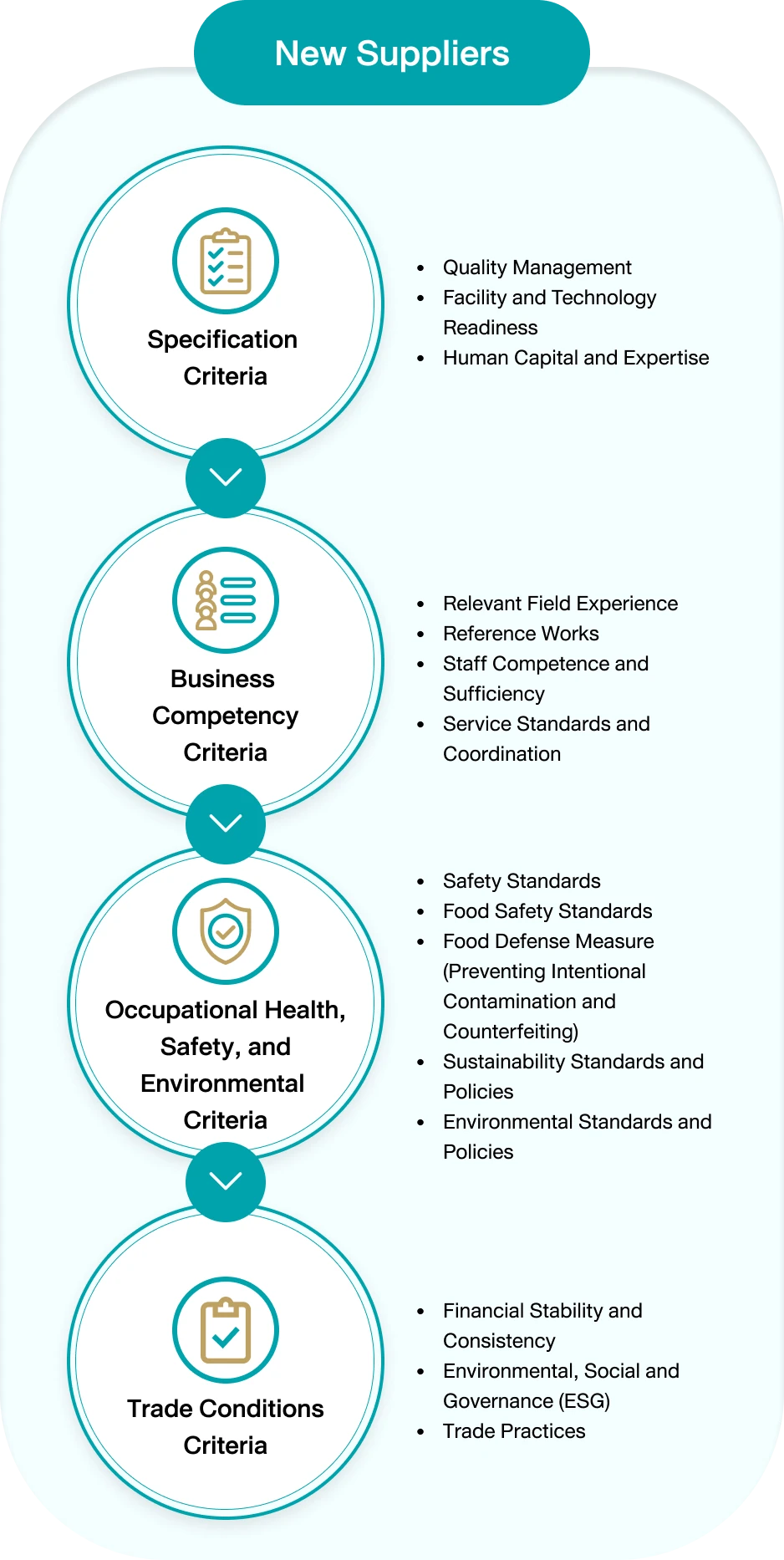
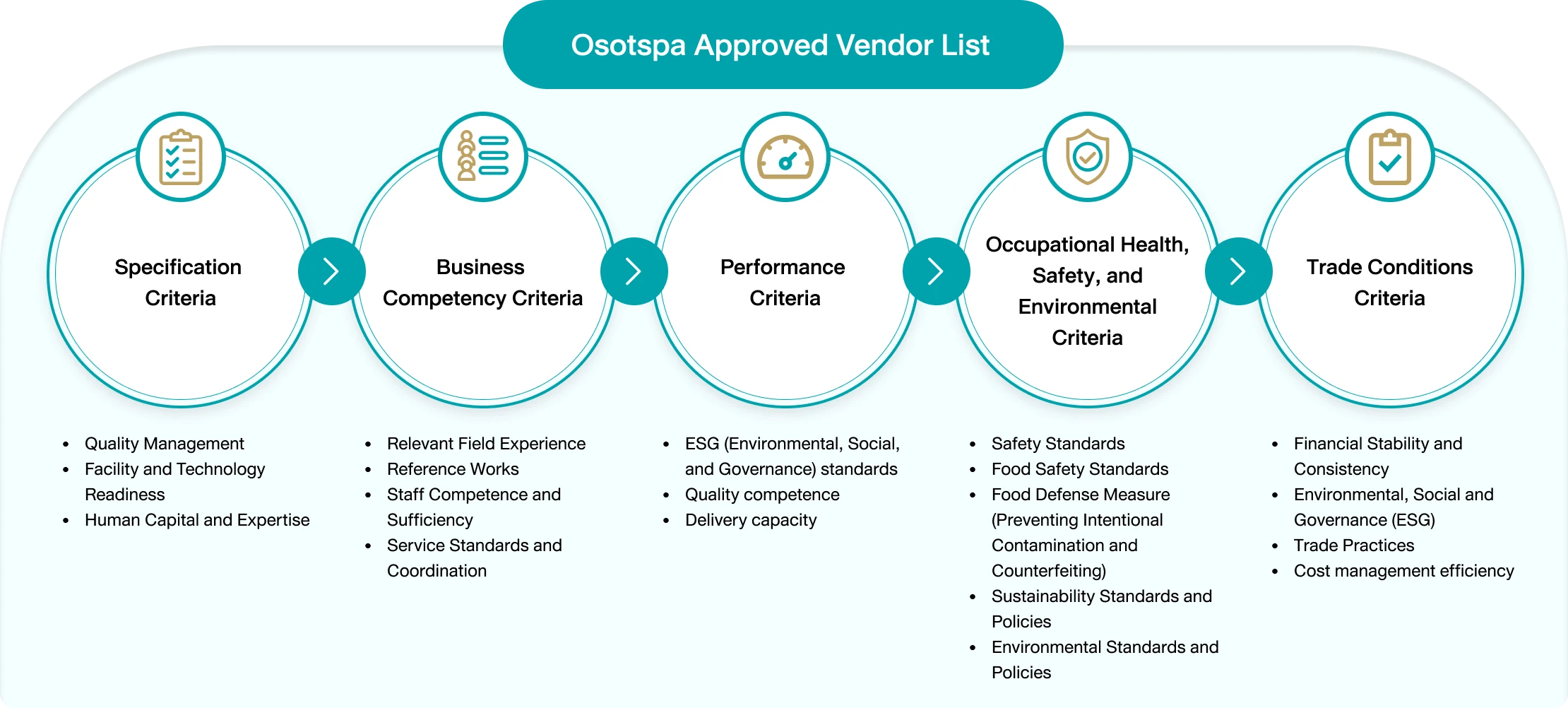
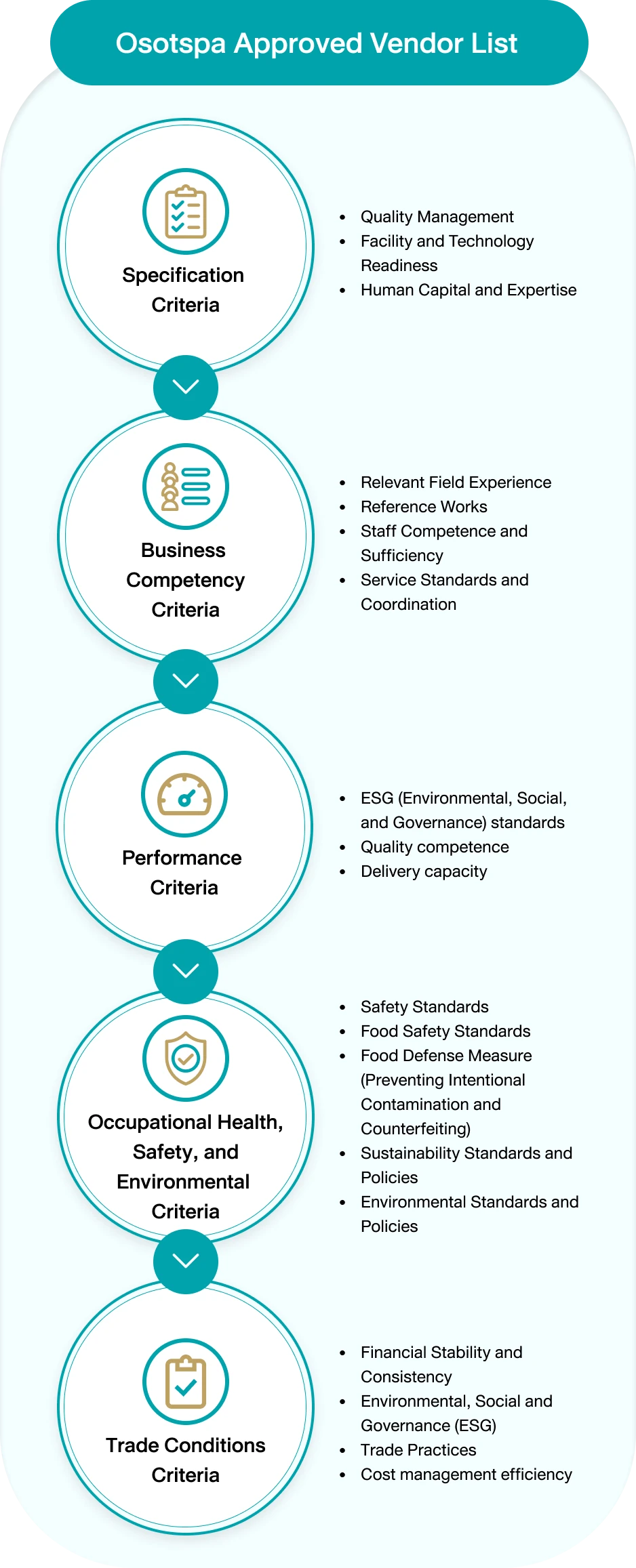
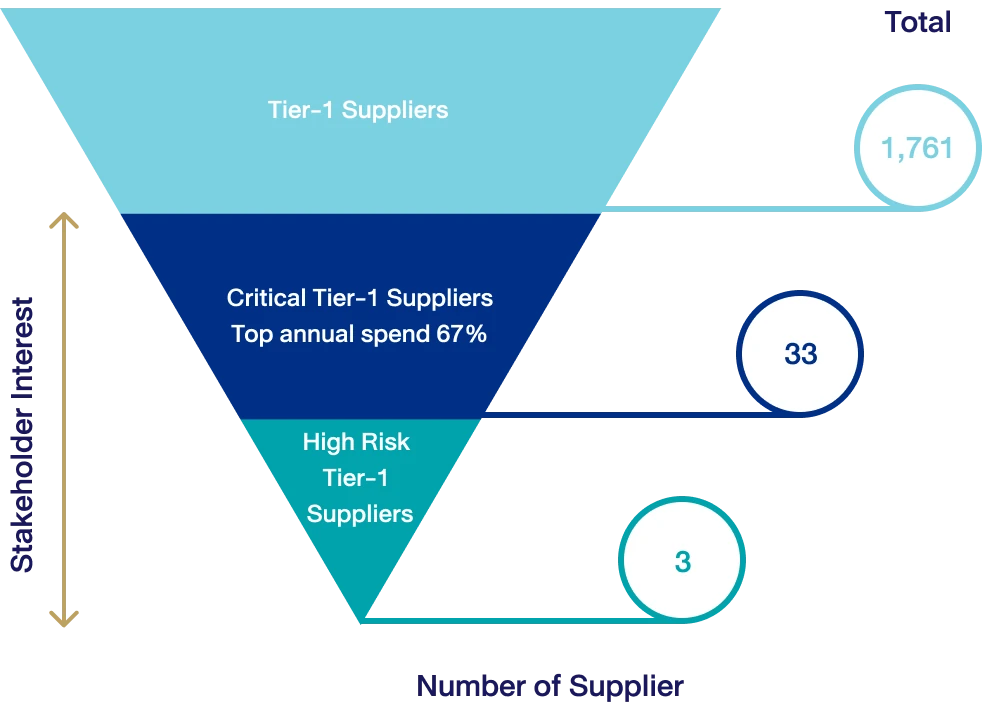
and various risk factors spanning multiple areas,
- Country-specific risk, which pertains to the economic, social, and political conditions as well as other external factors in the region where the partner companies operate.
- Sector-specific risk, which is linked to the specific industry in which the suppliers operate.
- Commodity-specific risk, which relates to potential price fluctuations. All of these criteria must be met. In this regard, existing suppliers in the vendor list will also undergo annual evaluations using the same criteria.
Supplier Categorization
To effectively drive the sustainability strategy, Osotspa employed ISO 20400 Sustainable Procurement standards to manage suppliers. The categories of suppliers are defined as follows:
- Significant suppliers are those who have close business ties to Critical Tier 1 suppliers and/or have an impact on the company's economic, social, and environmental (ESG) performance.
- Critical Tier 1 suppliers refer to suppliers within the direct material group that meet the following criteria: 1.) High trading value: These suppliers account for more than 67% of the total trading value of the Approved Vendor List. 2.) Strategic Partners: These suppliers actively participate in joint procurement planning or have agreed to collaborate with Osotspa to initiate joint project development. 3.) Rare Replacement Options: These suppliers are either scarce or difficult to replace, indicating their value in the supply chain.
- Critical non-Tier 1 suppliers are raw material suppliers to Tier-1 suppliers including farmers and small suppliers.
Performance Highlights
Osotspa works with its partners to expand its business and explore new opportunities that are socially and environmentally responsible. We work with our partners to ensure sustainability is managed and capabilities are enlarged so as to create positive impacts together. These collaborations lead to our products being delivered to our customers in Thailand and around the world on time, in the right quantity, and at reasonable prices.
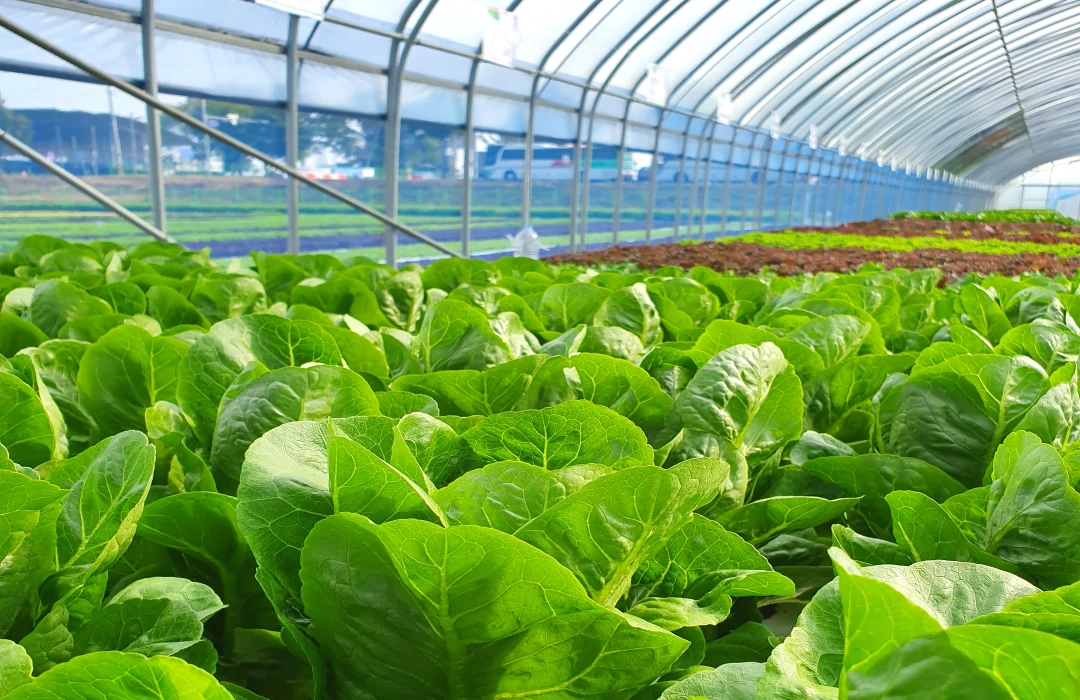
Sustainable Agricultural Programs and Commitments
Agricultural raw materials are essential for ensuring product quality.
Osotspa is committed to sustainable agricultural material sourcing, with the goal of reducing environmental and social impacts throughout the supply chain while promoting positive consumer perception and satisfaction. The Company strives to source agricultural raw materials, which are critical inputs in the manufacturing process, from distributors who follow responsible practices. In 2023, Osotspa has issued Sustainable Agriculture policy & guidelines in place to align with all agricultural raw material suppliers (both Tier-1 and non-tier 1).
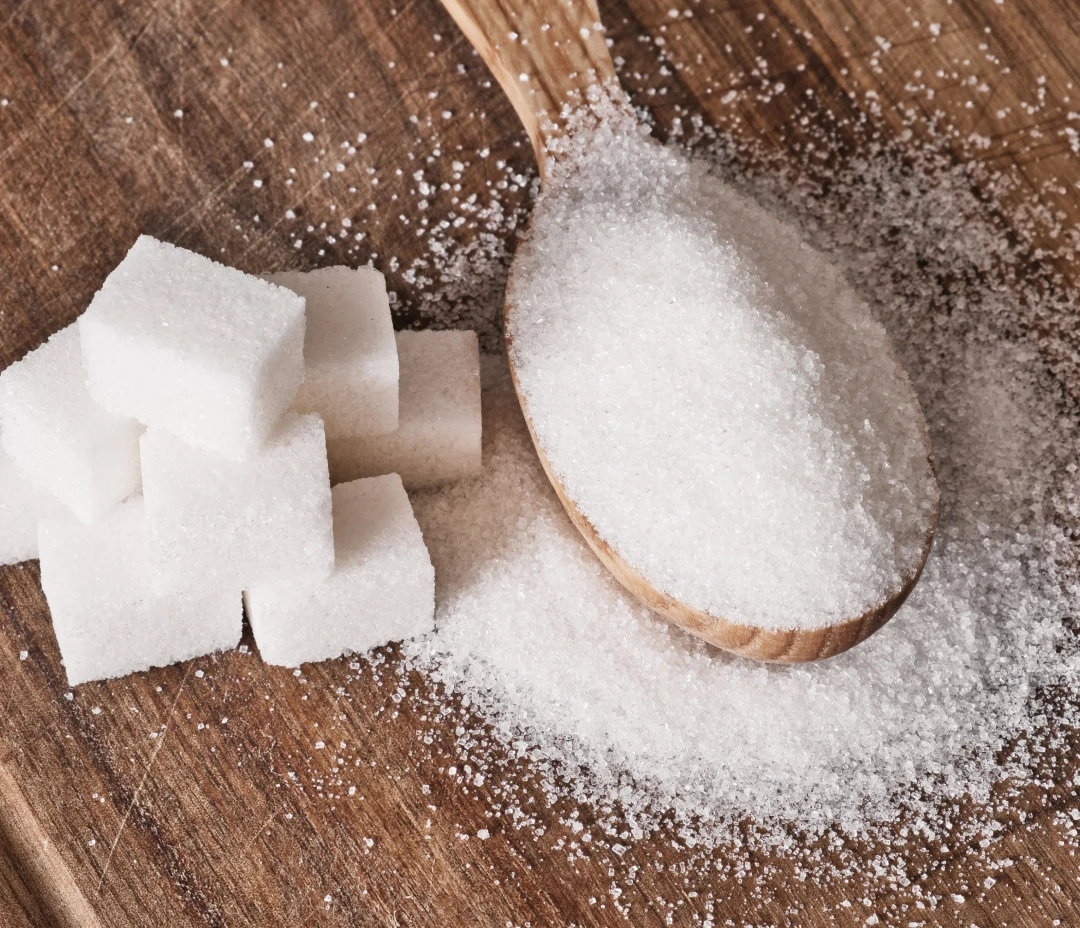
Purchasing of Raw Materials and Agricultural Products
Agricultural raw materials account for
Osotspa expresses its commitment to prioritizing procurement from partners that comply with sustainable production standards (BonSucro, VIVE, SMETA, Fairtrade), while also supporting and promoting collaboration towards sustainable development.
Osotspa is firmly committed to sourcing from suppliers that adhere to internationally recognized sustainable production standards such as BonSucro, VIVE, SMETA, and Fairtrade. The Company actively supports and collaborates with its supply chain partners to foster long-term sustainable development. In 2024, sugar certified under the Fairtrade standard represented 10.72% of the total sugar procured from production sources. Furthermore, in 2025, Osotspa expanded its commitment to sustainable sourcing, with BonSucro-certified sugar accounting for 3% of the total sugar procured.
The Company’s sustainable agricultural sourcing practices extend across a range of critical initiatives, including Programs to reduce water consumption, Programs to reduce environmental pollution, Programs to protect soil health, Programs to prevent the destruction of ecosystems, and Programs to reduce GHG emissions.
Although Osotspa’s raw materials are not directly related to animal-based industry, some products contain milk-derived ingredients such as Calpis Lacto beverages, which use fermented milk and skim milk powder, and Babi Mild & Beyond Double Milk Organic, which contains milk and soy extracts. The Company ensures that all animal-derived raw materials are sourced from suppliers and farms that comply with relevant quality and safety standards, including those related to animal welfare, to ensure responsible sourcing practices and product safety. The Company also applies ESG supplier assessment criteria in line with ISO 20400 Sustainable Procurement guidelines. Suppliers failing to meet basic requirements within the specified timeframe will not continue business partnerships.
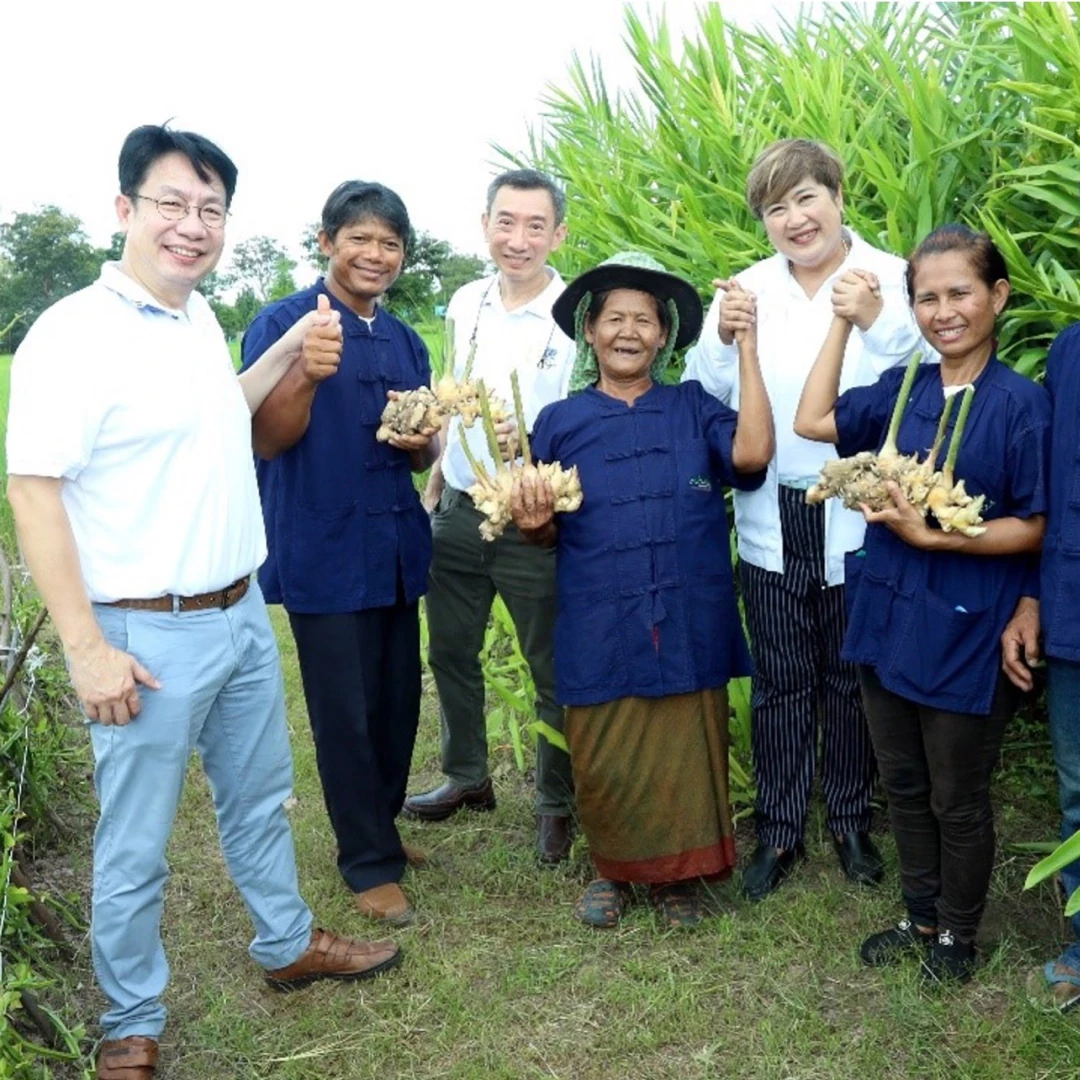
Boosting the quality of life with science, technology,and innovation
With the vision of being "The Power to Enhance Life", Osotspa has operated its business in accordance with sustainable development principles, with the goal of improving the quality of life for people in society.
The Company has launched a project to provide economic opportunities for small herbal ingredient suppliers while also utilizing herbal ingredients from sustainable sources.
To achieve this goal, Osotspa has worked with the NSTDA (National Science and Technology Development Agency), universities, agricultural agencies, and farmers to educate and promote water use reduction, pollution reduction, soil health protection, ecosystem destruction prevention, greenhouse gas emission reduction and to enhance production efficiency, process herbs, and develop agricultural resources in the Thung Kula Rong Hai area. Deploying technology and innovation, we have sourced high-quality herbal ingredients to help farmers increase their income, improve their quality of life, and promote long-term economic, community, and societal growth. For this project, Osotspa has chosen herbs that are either largely used in production or are similar in type to those already cultivated by Thung Kula Rong Hai farmers. Ginger, which is widely used, and Plai and Andrographis paniculata, both of which are commonly grown by local farmers, are among the herbs chosen.
Results/Benefits
- To assist farmers in producing herbal ingredients that are of high quality, standard, and value.
- To increase farmer income and improve their quality of life, thereby promoting long-term economic, community, and societal growth in accordance with established standards.
- Through collaboration with the NSTDA and farmers, OSP obtains high-quality herbal ingredients from known sources.
- To assist farmers in accessing new markets.

Sustainable Herb Farming
Osotspa collaborates with many parties to address the challenges associated with sustainable agriculture.
Together with the Herbal Products Division of the Food and Drug Administration under Thailand’s Ministry of Public Health and our suppliers, we launched the Sustainable Herb Procurement Project in 2020. The goal is to maintain a consistent supply of high-quality Thai herbs that are also environmentally friendly. This project not only helps Osotspa reduce risks in its supply chain, it also helps participating farmers gain access to markets, increase production capacity, and generate long-term income.
Can Grow in Thailand's Climate have been Sourced from Local Farmers
Joined Osotspa's Sustainable Herb Farming Program
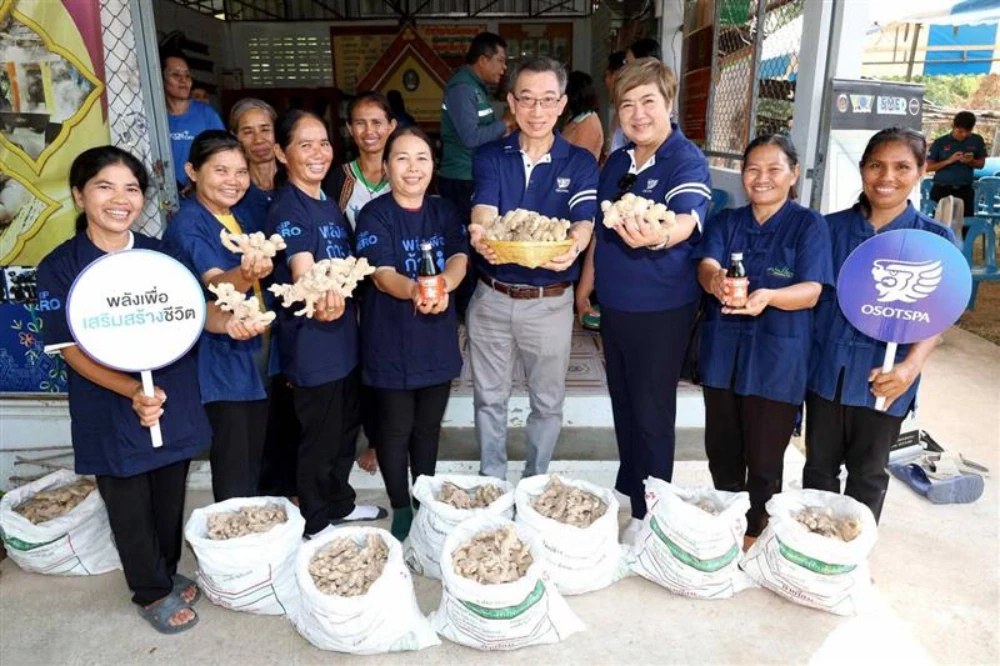
Promoting Quality of Life for Farmers in Thung Kula Ronghai
Empowering Thai farmers with safe, chemical-free ginger through science and innovation for sustainable living.
The company supports a project to uplift farmers in the Thung Kula Ronghai area using science, technology, and innovation in medicinal plants. Over 680 kg of fresh, chemical-free ginger grown by participating farmers was delivered to Huai Thap Than Hospital in Si Sa Ket for development into herbal medicines. The project is a collaboration with NSTDA and local agencies in Si Sa Ket, Roi Et, and Maha Sarakham, aiming to enhance production efficiency, add value to herbal crops, and improve farmers’ livelihoods sustainably.
Delivered over
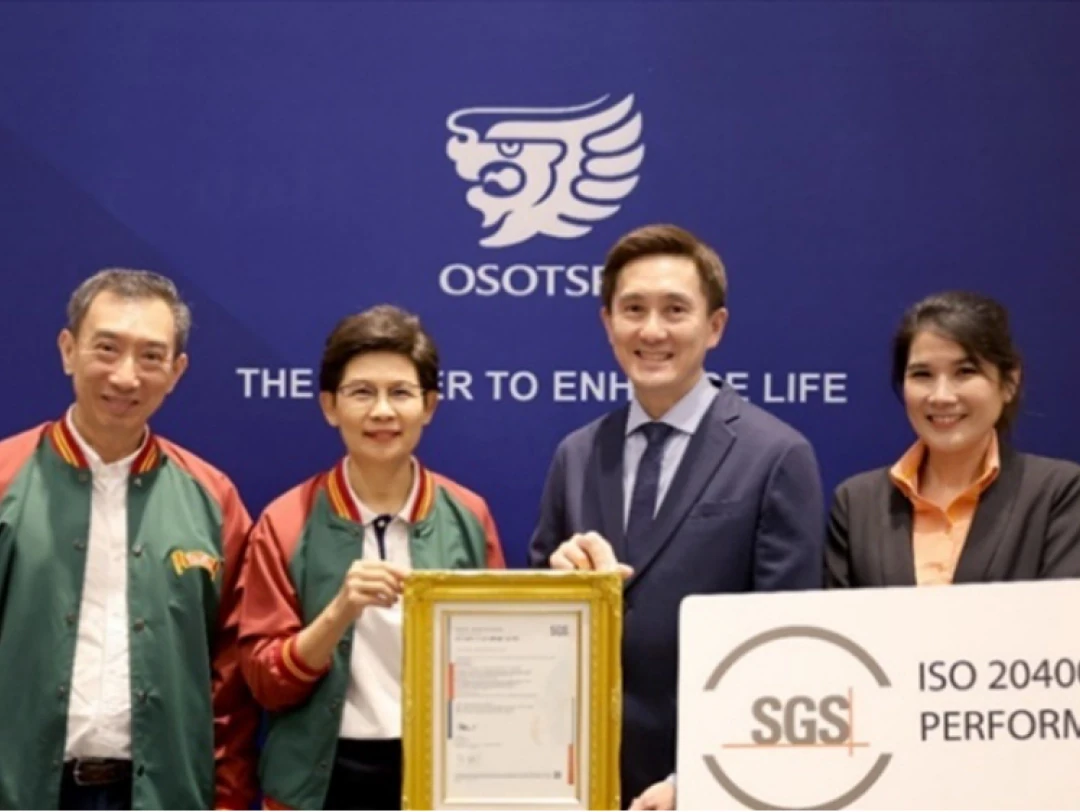
Osotspa has been awarded a certification for Sustainable Purchasing Standards (ISO 20400 Sustainable Procurement),
marking a significant advancement in its commitment to enhancing sustainability across its supply chain. In alignment with the Company’s vision of being 'The Power to Enhance Life' for consumers and society, we have implemented the international standard ISO 20400:2017. This initiative elevates Osotspa's sustainable procurement practices to meet global standards, fostering a sustainable procurement system and promoting supplier sustainability operations.
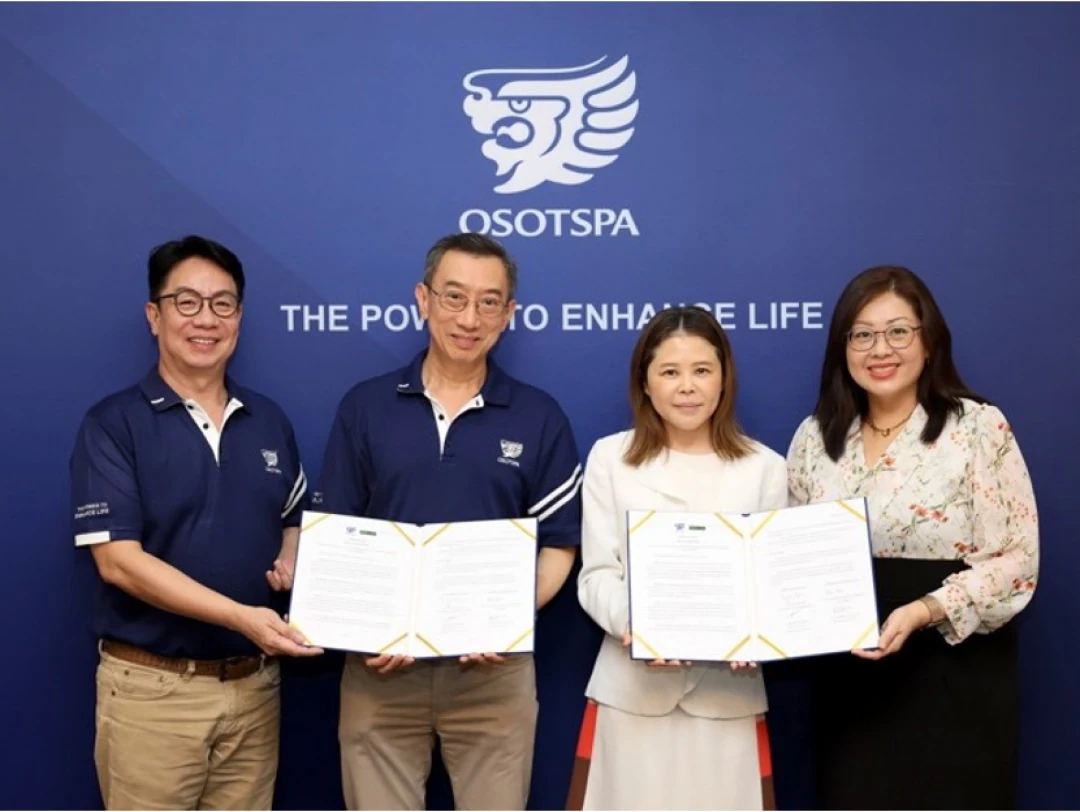
Plastic Recycling Project
The Company recycles plastic scraps to produce new plastic pellets, which are then used for making plastic film for Osotspa's beverage packaging. These plastic scraps are melted into Post-Consumer Recycled Resin (PCR). To produce a new packaging film, 30% PCR is blended with 70% virgin pellets. The main objective of the project is to raise awareness about the importance of improving and enhancing the efficiency of production, processing, and further development of the plastic pellet recycle process from used plastic scraps originating from Osotspa's factories and subsidiary companies.
Osotspa has partnered with Union J. Plus, a plastic pellet manufacturing company, to use plastic scraps from Osotspa and its subsidiaries as raw materials for producing PCR pellets. Following that, these pellets will be returned to Osotspa and used for producing packaging materials for wrapping or packaging Osotspa products, ensuring compliance with all relevant standards.
Collaboration Objectives:
- To promote and advance sustainable development by leveraging plastic scraps to enhance the business of both companies, including alignment with the Mission to Carbon Neutral.
- To establish a connection between the market for selling plastic scraps from industrial factories and plastic pellet production for producing new packaging, while expanding marketing channels for purchasing plastic pellets.
- To support the implementation of Sustainable Procurement Guidelines (ISO 20400).
Results/Benefits
- Achieved a 30% reduction in expenses related to purchasing virgin plastic pellets.
- Pioneered the use of a blend of PCR and Virgin pellets in the production of packaging film for wrapping or packing products.
- Contributed to sustainability efforts, leading to a reduction in carbon dioxide emissions through:
- Utilization of Recycled Resin
- Implementation of Circular Economy principles: Make-Use-Return
- Streamlined the plastic scrap sourcing process by forming strategic partnerships with specialized purchasing agencies, eliminating the necessity of searching for multiple buyers. A memorandum of understanding (MOU) was signed with the explicit objective of supplying all plastic scraps exclusively to Union J Plus Co., Ltd.
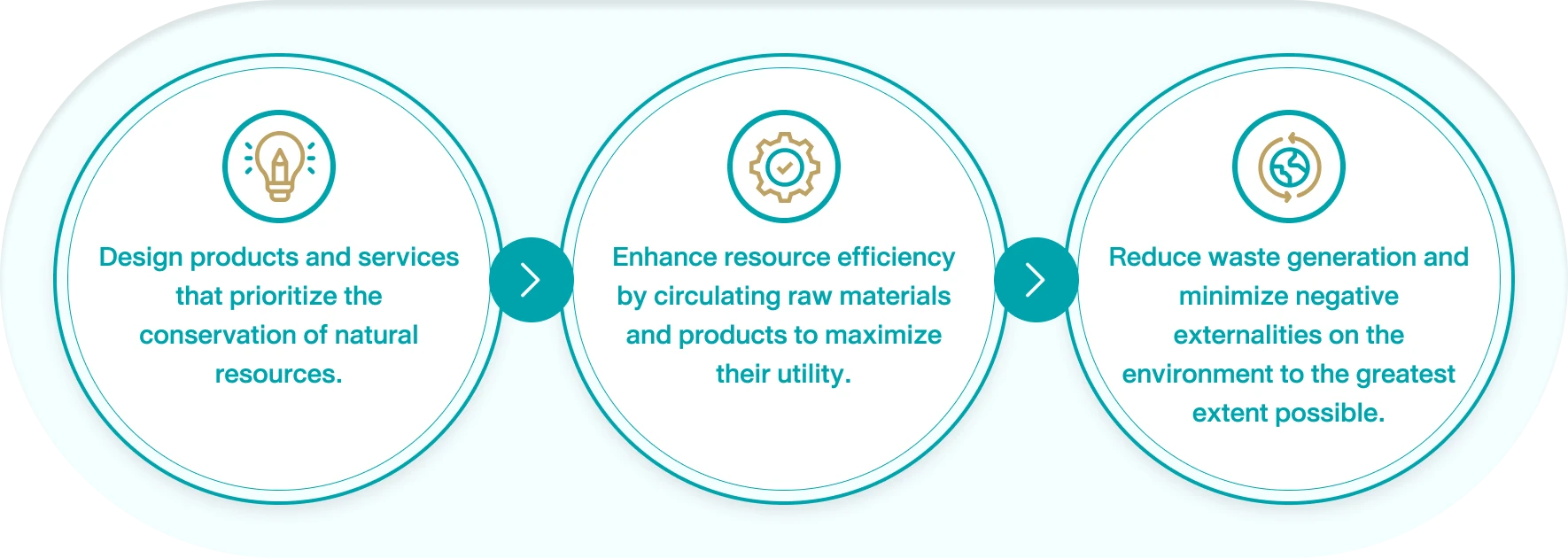
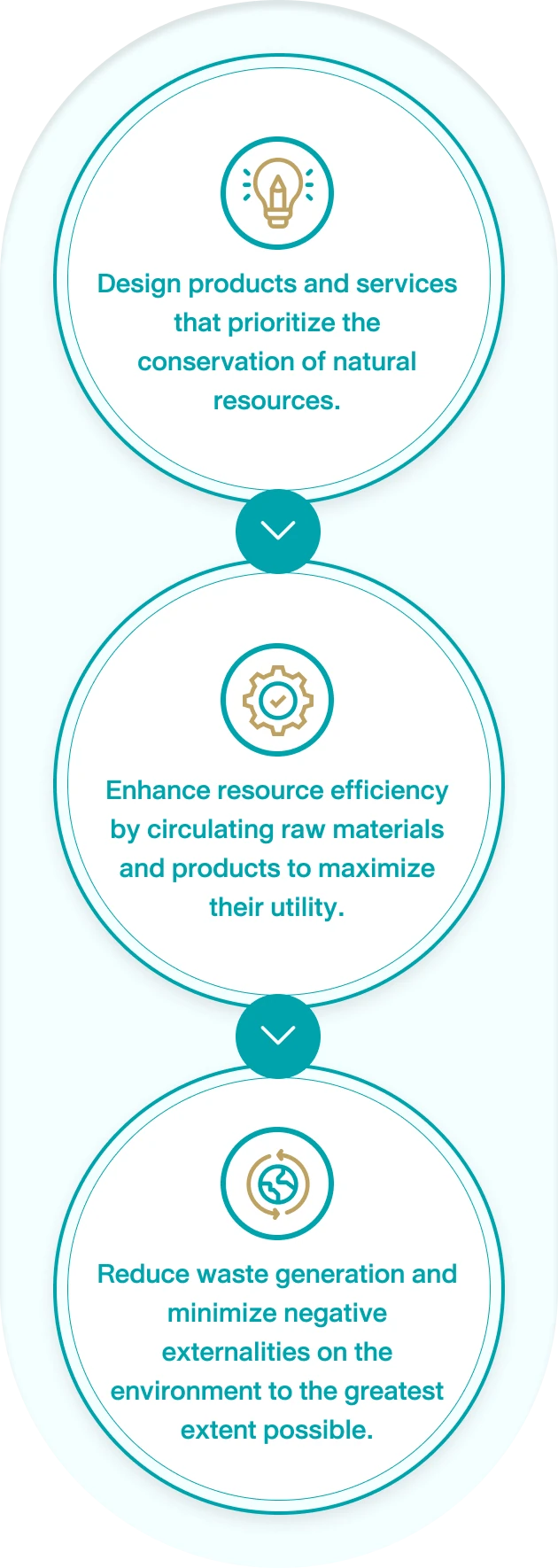

In 2023 Osotspa conducted a risk assessment of surface water and groundwater resources available at our suppliers’ operating areas. The evaluation covered the following aspects
- Quantity, Sufficiency and Quality
- Local laws and pricing structures
- Impacts on climate and physical elements
- Acknowledgement and understanding of surrounding communities

Sustainable Cullet Sourcing
Osotspa places a high value on packaging production, just as it does on high-quality beverage production. Today, the majority of our sales are beverages in sealed glass bottles. The primary material used in the packaging manufacturing process is cullet, or shattered glass, which can help with cost optimization and risk reduction in the supply chain.To reduce raw material supply risk, we have developed sustainable cullet sourcing since 2020 by expanding our collaboration with both large and small cullet providers.
We aim to increase the capacity of recycling centers reduce the amount of waste from used glass bottles in Thailand and support independent waste collectors and recyclers (Saleng) through a system that incentivizes supplying Osotspa with cullet Furthermore, the Company shall expand partnerships to a broader range of small to medium-sized local partners. This is to help us achieve our goals in accordance with the circular economy and ensure an inclusive supply chain that leaves no one behind.
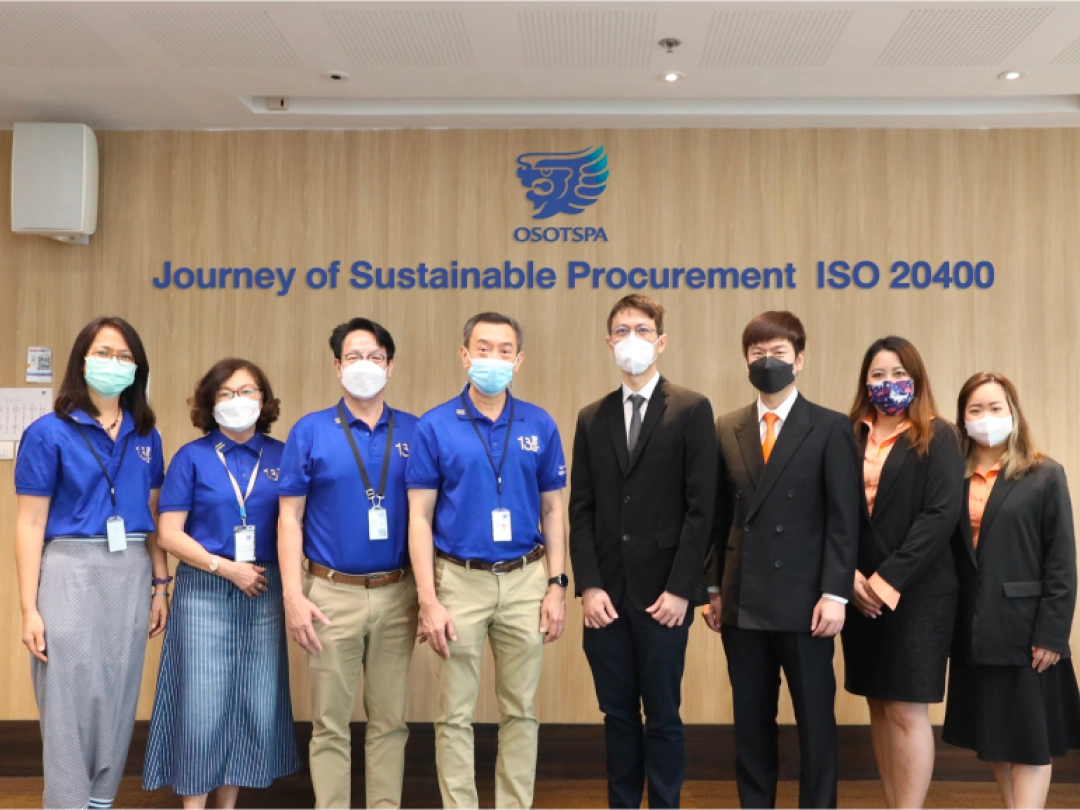
The Sustainable Procurement Journey (ISO 20400)
Osotspa is committed to extending performance sustainability throughout its supply chain to be consistent with the Company’s vision of “The Power to Enhance Life” for consumers and society.
To align with international standards, Mr. Viwat Krisdhasima, Chief Supply Chain and Digital Officer, led the adoption of the of Sustainable Procurement - Guidance ISO 20400:2017 for the supply chain operation system at Osotspa. We also support the sustainable operations of our suppliers by collaborating with SGS (Thailand) Limited in the “Journey of Sustainable Procurement ISO 20400” program, under which assessments will be conducted for the certification submission scheduled for 2023.
